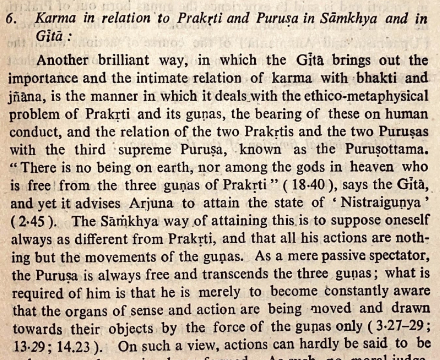Another brilliant way, in which the Gita brings out the importance and the intimate relation of karma with bhakti and jñāna, is the manner in which it deals with the ethico-metaphysical problem of Prakrti and its gunas, the bearing of these on human conduct, and the relation of the two Prakrtis and the two Puruşas with the third supreme Puruşa, known as the Purusottama. “There is no being on earth, nor among the gods in heaven who is free from the three gunas of Prakrti” (18.40), says the Gitā, and yet it advises Arjuna to attain the state of ‘Nistraigunya’ (2.45). The Samkhya way of attaining this is to suppose oneself always as different from Prakrti, and that all his actions are nothing but the movements of the guņas. As a mere passive spectator, the Purusa is always free and transcends the three guņas; what is required of him is that he is merely to become constantly aware that the organs of sense and action are being moved and drawn towards their objects by the force of the gunas only (3.27-29; 13-29; 14.23). On such a view, actions can hardly be said to be voluntary and consciously performed. As such, no moral judgement can truly be passed regarding the conduct of man. And, the system being indifferent to the problem of the existence of God, there is no necessity of a further bond between man and God, and therefore no such things as surrender, prayer, grace, meditation and realization of God. What the Gita did as a miracle, so to say, and as having taken a great step beyond the Upaniṣads, was to transform the nature of both the Prakrti and the Purusa and to subsume them under the third category, namely, the Paramatman or the Purusottama. Though Prakrti is as ‘anādi’ as Purusa, the Gita does not consider it as an independent source of activity. The only independent Being and the only source of activity, including the power to create, to sustain and to dissolve the universe, according to the Gità, is nothing but God. “There is nothing beyond Me, O Arjuna; in Me is woven all this, like beads on a string”, says Krsna (7.7). Even the eightfold Prakrti comes forth directly from God (7.4). With specific reference to the guņas, the Gita asserts that they owe their existence to God only (7-12). And, so far as the soul is concerned, he is but a portion (ansa) of the Lord (15.7). Though he dwells in Prakṛti and is said to experience the gunas born out of Prakṛti, he is at the same time both the ‘onlooker’ and the ‘approver’ (Upadrasta and Anumanta) of the course of actions which the Prakṛti wants to take. Nay, being of the nature of the highest Atman also, he is capable of making the three gunas subservient to his own spiritual development (13-21-23)

